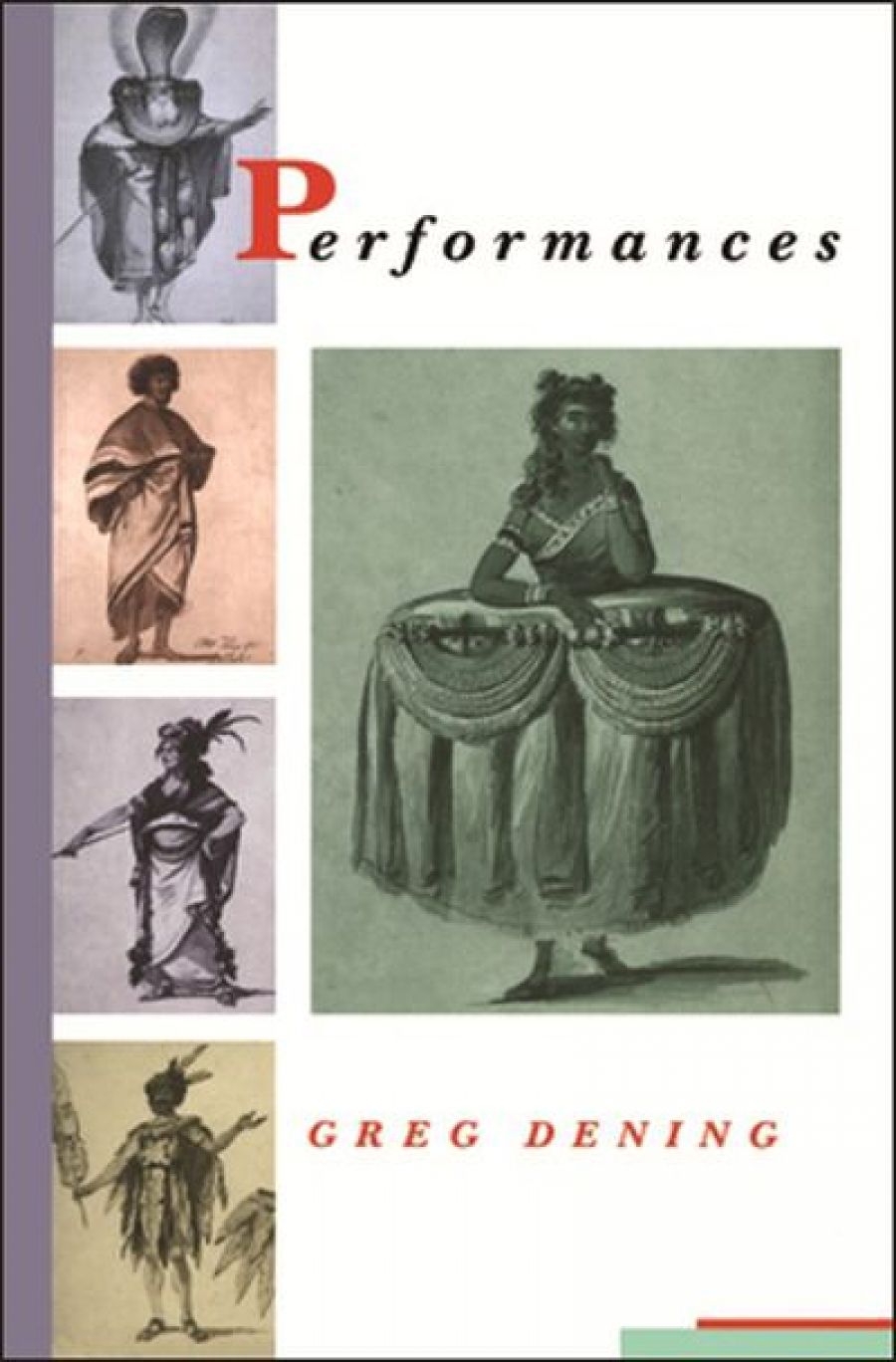
- Free Article: No
- Contents Category: Biography
- Review Article: Yes
- Online Only: No
- Custom Highlight Text:
Greg Dening was trained for the Catholic priesthood. He became an outstanding historian of the Pacific, although perhaps better described as an anthropologist-historian, in company with Clifford Geertz, Marshall Sahlins, Nathalie Zemon Davis, and his colleague Rhys Isaac, to whom this book is warmly dedicated. Yet echoes of his initial calling linger in his work, certainly as evidenced in this collection of essays.
- Book 1 Title: Performances
- Book 1 Biblio: MUP, $29.95 pb, 296 pp
To make history we must first know ourselves, Dening insists, ‘we must have an ethnographic sense of our cultural persons’. So, for the first of his performances, Dening gives us ‘Ethnography of My Mind’. It is a marvellous beginning:
I saw them, years after they had made indelible images on my mind, in a second-hand furniture store. Stacks of straight-backed chairs, felt-covered kneelers, prie-dieux, marbletopped wash-stands, small tabledesks. I had sat on them learning the dog-Latin that had filled my days, or ‘did’ my spiritual reading at them, or knelt at them, my soul squirming in ‘desolation’ or soaring in ‘consolation’. I had washed and shaved at them, shivering behind the curtains of my small dormitory of six young men at some unearthly hour of the morning. I had stood beside them in these same cubicles on Tuesday and Friday nights, stripped to the waist waiting for the ‘tocsin’ bell that signalled the beginning of penances. Then, breathlessly answering the verses of Psalm 140, ‘Deliver them, O Lord, from evil men’, my companions and I would flog ourselves with small rope disciplines. I remember the fear and humiliation of these sessions. Some of those around me would flog themselves mercilessly and I, physical coward that I was. flinched at the pain and tried to temper the bite of the cords.
When Dening can wrest this kind of evocative prose from his ethnography, the history is enthralling, as it is in much of his prize-winning book, Mr Bligh’s Bad Language, and in his terrific essay on the Battle of Valparaiso in 1814. ‘Battles are messily human’, Dening writes, ‘it will be a good historian who understands them and a better one who can describe them’. The same could be said for a mutiny. On both counts Dening has proved himself, re-inventing the past moment as theatre, as performance. Statistics, so mind-numbing in many historical accounts, are turned to great effect. Recounting the battle between the American ship Essex and the British Phoebe as a duel played out beneath the bluff of Valparaiso before thousands of spectators, Dening includes the aside that American naval officers were so given to duelling that by 1848 they had killed thirty-six of one another, while their enemies had killed only fifty-four in all their wars. These numbers tell us something fundamental about why seven hundred men in Valparaiso were prepared to gamble so deeply in a war someone else had invented, in a battle that didn’t even matter, in a place at the end of the earth that no one cared about:
The duelling code, even nicer than parlour etiquette, defined class and group membership powerfully. The code legitimised the highest gamble of all – with life as the stakes – by raising the trivialities of honour above any other obligation or right. Motivation for this apparent extravagance came from socialising forces of enormous strength, the same sort of strength that transformed hesitant human nature in the face of battle into carelessly courageous fighting men.
There are several humane, enlivening essays of this kind in Performances, yet the proselytising is fairly relentless, an unfortunate effect, perhaps, of collecting together in one volume a series of didactic pieces given at different times and for different occasions and purposes. Dening is very much better when he does the imaginative history than when he lectures us about it. In expository mode his prose goes to pot; he uses words I do not understand, invents other words and persists in turning nouns into verbs.
Now, I am hugely sympathetic to Dening’s approach to history and I admire what he has been able to create with his theatrical imagination. I agree wholeheartedly when he says, ‘Academic history has lost its moral force because it has been subverted by its own reality and lost its sense of theatre … history that is seen to believe its own fictions is a fraud and a bore.’
But when he too forsakes the theatre for the lectern, I find myself shifting uneasily and my mind wanders off to more engaging matters, try as hard as I might to attend to the lesson. I can’t help but wonder if history which constantly has to draw attention to its practice in this way might not also be considered a bit of a fraud. Certainly, it can get boring.
Happily, in Performances, I can skip those pages and join the clammyhanded Fletcher Christian bare-arsed in his nightgown on the deck of the Bounty or the cranky James Cook approaching Hawaii in Resolution to be entertained as well as instructed by the meanings Dening draws from the vivid theatre he has created from the detritus of the past.


Comments powered by CComment